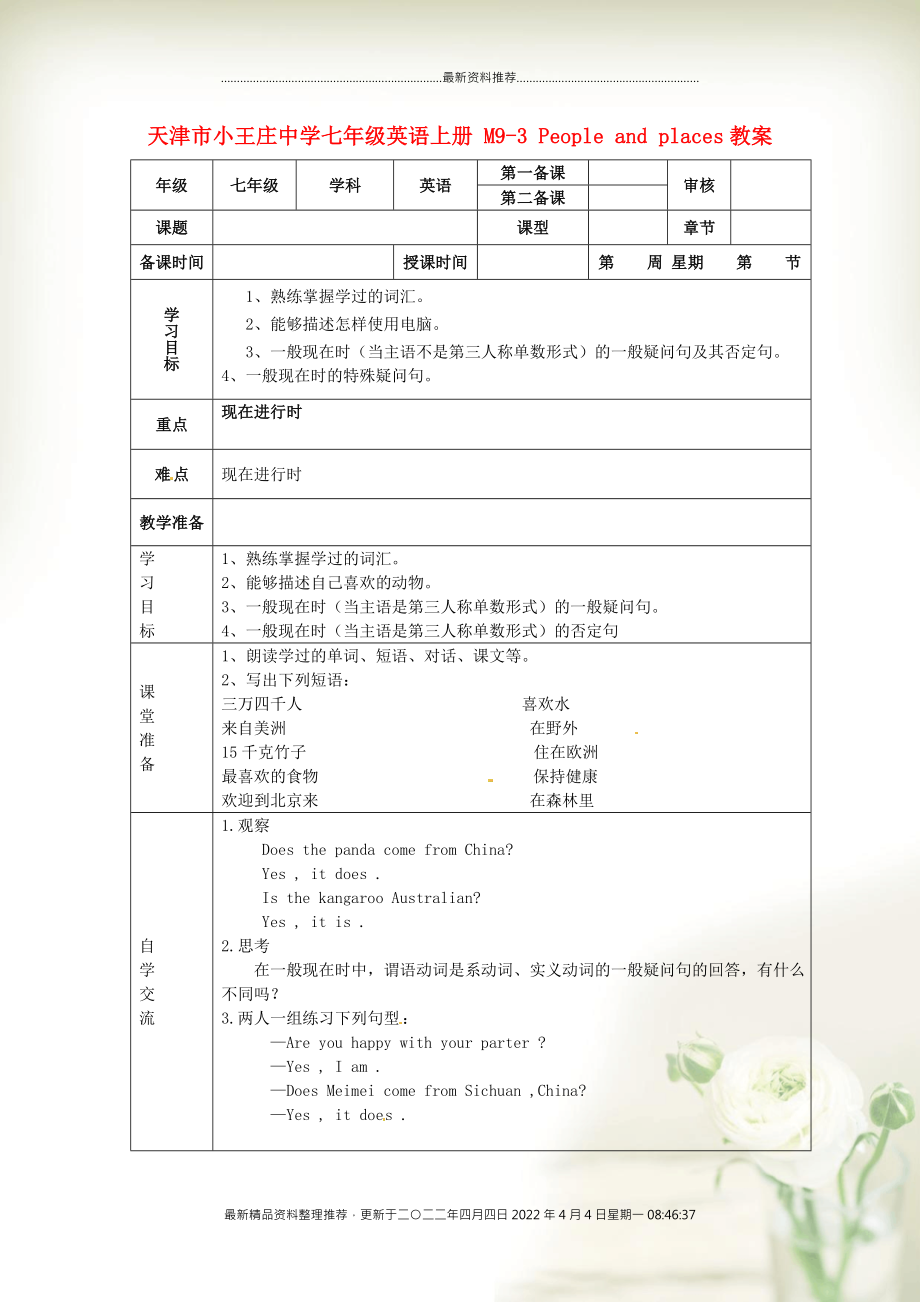《天津市小王莊中學(xué)七年級(jí)英語(yǔ)上冊(cè) M9-3 People and places教案 (新版)外研版》由會(huì)員分享��,可在線閱讀�,更多相關(guān)《天津市小王莊中學(xué)七年級(jí)英語(yǔ)上冊(cè) M9-3 People and places教案 (新版)外研版(2頁(yè)珍藏版)》請(qǐng)?jiān)谘b配圖網(wǎng)上搜索���。
1����、……………………………………………………………最新資料推薦…………………………………………………
天津市小王莊中學(xué)七年級(jí)英語(yǔ)上冊(cè) M9-3 People and places教案
年級(jí)
七年級(jí)
學(xué)科
英語(yǔ)
第一備課
審核
第二備課
課題
課型
章節(jié)
備課時(shí)間
授課時(shí)間
第 周 星期 第 節(jié)
學(xué)習(xí)目標(biāo)
1�、熟練掌握學(xué)過的詞匯。
2�����、能夠描述怎樣使用電腦�。
3、一般現(xiàn)在時(shí)(當(dāng)主語(yǔ)不是第三人稱單數(shù)形式)的一般疑問句及其否定句��。
4����、一般現(xiàn)在時(shí)的特殊疑問句。
重點(diǎn)
現(xiàn)在進(jìn)行時(shí)
難點(diǎn)
現(xiàn)在進(jìn)行時(shí)
教學(xué)準(zhǔn)
2��、備
學(xué)
習(xí)
目
標(biāo)
1�����、熟練掌握學(xué)過的詞匯。
2�、能夠描述自己喜歡的動(dòng)物。
3����、一般現(xiàn)在時(shí)(當(dāng)主語(yǔ)是第三人稱單數(shù)形式)的一般疑問句。
4�、一般現(xiàn)在時(shí)(當(dāng)主語(yǔ)是第三人稱單數(shù)形式)的否定句
課
堂
準(zhǔn)
備
1、朗讀學(xué)過的單詞���、短語(yǔ)����、對(duì)話�、課文等����。
2、寫出下列短語(yǔ):
三萬四千人 喜歡水
來自美洲 在野外
15千克竹子 住在歐洲
3�����、
最喜歡的食物 保持健康
歡迎到北京來 在森林里
自
學(xué)
交
流
1.觀察
Does the panda come from China?
Yes , it does .
Is the kangaroo Australian?
Yes , it is .
2.思考
在一般現(xiàn)在時(shí)中,謂語(yǔ)動(dòng)詞是系動(dòng)詞���、實(shí)義動(dòng)詞的一般疑問句的回答�,有什么不同嗎
4����、?
3.兩人一組練習(xí)下列句型:
—Are you happy with your parter ?
—Yes , I am .
—Does Meimei come from Sichuan ,China?
—Yes , it does .
合
作
探
究
1.我會(huì)做:(Activity3)
1) The snake (come) from America .
2) Snakes (live) in Asia ,Africa ,America ,Australia
5�、 and Europe .
3) The monkey (eat) fruit .
4) Monkeys (come) from South America .
5) The wolf (live) in the European forests .
2.做Activity 4 并根據(jù)所填內(nèi)容造句。
3.閱讀Around the world ��。
鞏
固
提
高
根據(jù)首字母�、中文或句意提示,寫出單詞�。
1).Beijing zoo ___—————— (有) many animals.
6、
2). His brother comes from ________( 非洲).
3). That man is my __________ (英語(yǔ)) teacher.
4). How many ___________(camel) are there in the zoo ?
5). W_________ you like to see Lingling?
6). W_______ to Beijing Zoo.
拓
展
延
伸
單項(xiàng)選擇
1) I often TV on Friday evening .
A look
7�����、 B see C watch D watches
2) She to the movies with her friends on weekends .
A go B going C to go D goes
3) I a computer . Jim also a computer .
A have ,have B have ,has C has , has D has , have
8��、
4) your mother this book ?
A Do , like B Does , like C Do , likes D Does , likes
學(xué)
后
反
思
通過本課學(xué)習(xí)����,我的問題表現(xiàn)在:
最新精品資料整理推薦���,更新于二〇二二年四月四日2022年4月4日星期一08:46:37
 天津市小王莊中學(xué)七年級(jí)英語(yǔ)上冊(cè) M9-3 People and places教案 (新版)外研版
天津市小王莊中學(xué)七年級(jí)英語(yǔ)上冊(cè) M9-3 People and places教案 (新版)外研版

